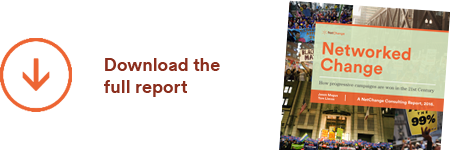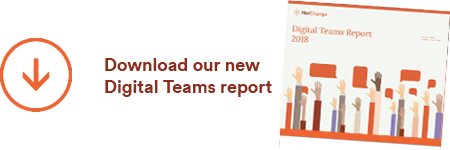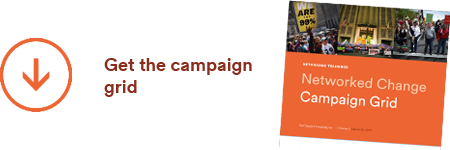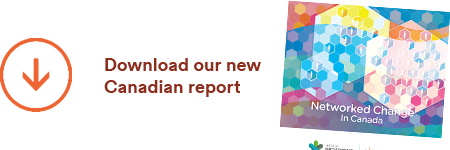Last month I had the pleasure of being the opening keynote speaker at the Social Media for Non-profits all day conference in Vancouver. The organizers asked me to help set the tone for the day.
I find a lot of events like too trendy buzz-wordy, overly focused on positive things, and thin on actual substance. The annoying, cliche’d opening video about “how the internet changes absolutely everything” using over-hyped “facts” about web growth confirmed my hunch. I wanted to provide something of lasting value to help shape the careers of the 200 or so, mostly young, attendees, and share what I’ve learned by staying in this industry for close to 20 years now.
The result: “How to survive Social media for non-profits: Why you have the best – and the worst – job”.
From the twittersphere and conversations I had after it was worth taking the risk to be controversial! The slide near the end about “stay in one job longer than you plan to” because real strategy chops are earned in the trenches, usually from failures, and if you keep jumping around whenever things get hard you’re not really learning life’s hard lessons, stuck a particular chord.
You can view the presentation below. I deleted the first 20 slides that set the context for a changed world and why many institutions have such a difficult time adapting, to get to the meat of this particular presentation. My notes for the slides are below.
The Web has changed advocacy, fundraising, communications
The 15 years since the start of online advocacy with NGO’s. Internet has been the vanguard of change and new models many times. From fundraising to constituency building, meme-spreading to supporting actual grassroots organizing, the web offers opportunities that orgs doing advocacy, fundraising, social service, volunteer engagement, education, etc have rarely seen in one place. But most is just “clicktivism”.
The core problem: the web is not a technology. It’s not ever just a communications or fundraising channel, it’s your whole organization.
Most institutions lack culture, structure, and people to lead in this new world.
Why you have the best job
First let’s start with the good news.
NGO’s have passion, purpose, and power
You are setting the agenda for society. Business gets all the press (and money) but this is cultural power.
You have access to meaning and mission, and in our increasingly chaotic world, this is a powerful drug.
You’re the creative storyteller
You are helping an earnest, do-gooder org that by nature spends as little as possible of its income on storytelling, marketing, and promotion. So you have to be creative. And the digital medium demands it of you! If you don’t’ have skills in messaging, writing, design, video, photos, you’ll hire freelancers who do. It’s rewarding to tell the stories. Even more so when you see what works!
You’re the people-power person
You’re often the closest (often) to the front lines, you represent the people. You have a rubric to view the world “is our constituency interested in this? Is this something that will catch fire?” and you have the power of metrics, and of feedback, to give to the rest of the org. If you use this power well, you are the key to real engagement and mobilization of people in your causes, events, and activities.
You’re transforming systems
While your employer is transforming society, you are transforming them. This field has been at the leading edge of technology, cultural change, and political change for 20 years. Technology and what it means is a wedge that is changing the whole culture: business, government, and NGO’s towards more democratic, connected, responsive, and open systems.
Engagement is transformative as it forces institutions to be in internal dialogue with all departments on what it means to connect with peers and other orgs, and how to involve people in their work in meaningful ways, and how to resource and support that involvement. You’re at the centre of that. Wear your badge with pride.
Why you have the worst job
The inertia of mediocrity
Our sector has little market feedback on if what they are doing is having impact. Measuring outputs not outcomes. Funding model is broken: scraping crumbs off capitalism’s always plentiful table to deal with all the externalities or things no one wants to look at.
Culturally, NGO’s are risk averse and slow to change. Leaders are often passionate technicians, not managers. You can easily hide here and BS your way through. Don’t do it.
Leadership struggles with innovation
Senior leadership are of a different generation, still many of whom don’t value or respect or really use the web to connect. See only the dark side of it: distracted culture, what their kids spend their time on, and are missing fundamental ways it’s impacting our culture.
Little Pro/Dev investment or people growth, consultants. Structures and funding models make it difficult to invest in and integrate transformative innovation.
Four limits of digital teams. Silos. Personality Fit. Overload. Lack of Digital Vision.
From our work published in Stanford Social Innovation Review.
The four limits of Digital Teams:
- Silos: stuck in wrong place to do integrated comms.
- Personality fit that is wrong for doing collaborative, creative experimentation.
- Overloaded with unrealistic expectations.
- Lack of focus or strategy, chasing after shiny baubles. Doing everything digital is NOT a strategy.
You don’t work in a 21st Century Institution
Ultimate problem: many NGO’s haven’t transformed themselves for a drastically changed world. I mean everything: programs, fundraising, communications, campaigns. Many haven’t even realized how much the game has changed. Sense of unease but pretending like everything is normal. It isn’t.
To do your job right, to really maximize the power of networks, you need a new vision, institution alignment, transformative leaddership at multiple levels towards new models. It’s extremely rare, but is happening more often.
How to survive social media for non-profits over the long haul
I want you to be in this game for long haul, don’t leave for the cushy corporate job. Here’s my best wisdom on how to rise above the day to day.
Master your craft
Don’t be half assed, or coast, it’s too easy. Go to conferences. Network yourself with peers. Ask for and receive feedback. Track competitors. Be constantly challenging yourself, your team, your program and your peers to do better. This is the best way to support your org + your career.
Focus your program
If you can’t change your organization, at least change your team, and your strategy. Focus on things that will have the most impact on your mission and your org’s core work. Develop this focus with other departments and other change-makers. Create buy-in and communicate out what your focus is so others know. Then stick to it, push back on distractions.
Lean heavily on metrics
Metrics are your ally, they are how you’ll win arguments, push back on poor ideas, and grow your program towards success. Be wary of “vanity metrics” like how big your list is, that other’s don’t understand and have no impact. Fools gold.
You might even catalyze a metrics driven culture across the org, the holy grail of networked impact orgs.
Ask for help
This shit’s hard, it takes a network to figure it out. That’s why I helped create WOC. Global project, TckTckTck $10M campaign, networked the whole thing. Be humble and open. No one expects you to be the expert of everything. The smartest people are the ones with the smartest advisors, and the smarts to ask.
Shape your world
Need to reposition your shop and your self from the tactical “Kinkos” to a strategic leadership group. Be able to push back and shape ideas, drive strategy, shape your plans.
Become a respected thought leader, not just in “digital” or “the web” (I correct people) but in communications, engagement, and new models for what works in your world. The web is all about meritocracy. Earn your way into the strategic role.
Do your work
Places like Hollyhock develops holistic leaders. To be a leader doesn’t just mean telling people what to do, or that they’re stupid. Don’t be the cliché arrogant young punk digital guy (trust me I know that one).
Become a great listener. Develop empathy. Understand how your bosses’ and others’ world works. Learn to get out of your own way for true “creative response” to really come through. Then don’t get too attached to your wins or your losses, they will also come and go in your career largely due to things far beyond your control.
Stay longer than you plan to
The classic Millennial has moved 8 places in 6 years, and doesn’t have a lot of self reflection on why. Its usually something about “they were limiting the advancement of my career”. Institutions are challenging, but so is everything. Stay at a challenging place for longer than you want. Get out only when it’s clear you’ve tried everything possible, and then tried some more.
You become a strategist because of your battle scars, it’s a title that’s earned in respect, not self-given. Stay longer than you plan and you’ll learn capacities beyond what you think you are capable of now.
Learn to embrace uncertainty
We live in uncertain times, and you are part of accelerating the uncertaintity. That’s why it’s so amazing, and so frustrating, often times in each and every day.
Change is tricky business, and being a wise agent of it requires great compassion, care, and discipline. Learn to embrace change and new models while staying grounded in what’s worked before, and bring people along with you, you need them.
This is some of what I’ve seen and learned and most of all experienced that can help you avoid many of the mistakes I’ve made. Now let’s get out there and have maximum impact on fixing the problems of the world!










